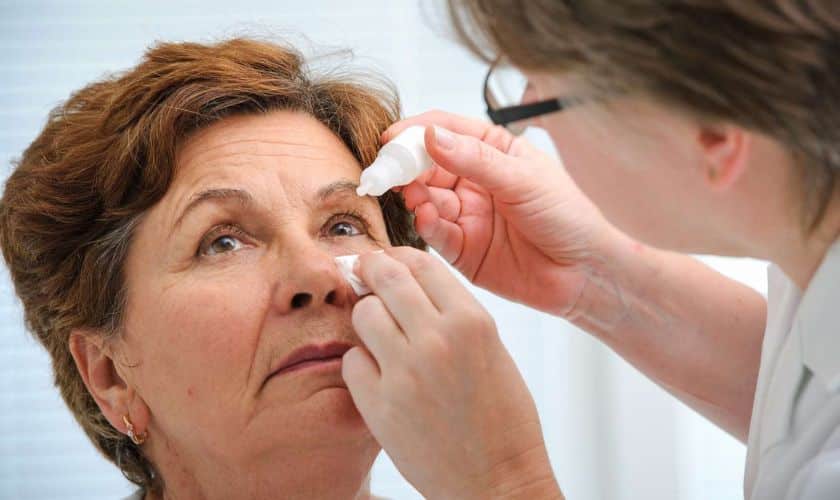Several things can cause dry eyes to happen after cataract surgery. The tear film on your eyes is the main reason. The tear film is a thin layer of liquid covering your eye’s surface. It has three layers, with a lipid layer on the outside.
The lipid layer helps to keep the tear film from moving around. This keeps tears from drying up, which keeps the eye’s surface smooth and moist.
Surgery to fix cataracts can thin the lipid layer. Because of this, the tear film becomes unstable, which makes the eyes feel dry.
Another Reason For Dry Eyes After Cataract Surgery Could Be:
Corneal Nerve Damage
Tears are made with the help of nerves in the cornea. If the surgery hurts a corneal nerve, it may make you blink less and have fewer tears, making your eyes feel dry.
Light Exposure
Your doctor will use a microscope with a bright light to remove your cataract. Your eyes’ goblet cells, which keep your eyes moist, may die off because of the light.
Inflammation
When you have surgery, like cataract surgery, your body usually reacts with inflammation. In this case, your eye could make fewer tears because of inflammation.
Eye drops with medicine
You’ll most likely need to use eye drops with medicine to help with pain and swelling after surgery. The pain relievers, corticosteroids, and preservatives in these eye drops might slow healing, making dry eye worse.
Also, if your eyes were already dry before surgery, the procedure could make them even drier. Other things that might make you more likely to have dry eyes after cataract surgery are:
Being older, having underlying health problems, or taking certain medicines, like nonsteroidal anti-inflammatory drugs (NSAIDs), after surgery.
What Do The Signs Look Like?
You might have dry eyes when your eyes don’t have enough tears. This can lead to things like:
- Eye pain, a burning feeling in the eyes
- Increased sensitivity to wind and light
- A feeling of something in the eye and blurred vision are all signs of glaucoma.
Can You Do Things At Home To Help Your Eyes Feel Better?
If your dry eyes aren’t too bad, you can do things at home that might help.
Dry Eye Remedies
The tears were fake. Eye drops that act like tears help keep your eyes moist. You don’t need a prescription to buy them at the drugstore.
Sunglasses
Sunglasses protect your eyes from the sun and wind, which can make dry eyes feel worse. It was often blinking. Try to blink a lot, especially when reading or using a computer. This can help keep the moisture in your eyes.
Stay Hydrated
Your symptoms can worsen if you don’t drink enough water, so make sure to drink a lot of water throughout the day.
A Humidifier Can Help
Dry eyes can be caused by dry air. A humidifier can help make indoor air less dry because it adds moisture to it.
Nutritional Supplements
Ask your doctor about eye drops to help with dry eyes. Omega-3 fatty acids and vitamin D are two nutrients that may help reduce inflammation in the eye.
How To Treat Dry Eyes?
After cataract surgery, you may need to see a doctor if you have severe dry eye symptoms. Depending on your symptoms and how dry your eyes are, an eye doctor may recommend one of the following:
Cyclosporine Eye Drops
After cataract surgery, cyclosporine may help reduce inflammation on the eye’s surface.
Lifitegrast eye drops. Lifitegrast can also help reduce pain and swelling. It is used to treat very dry eyes.
Punctal Plugs
To stop your tears from draining, punctal plugs are put into your tear ducts.
It’s important to remember that eye drops for dry eyes may not work for weeks or even months. So, even after you start taking prescription medicine, you’ll still need to use artificial tears.
When Do You Need To Go To An Eye Specialist?
Most of the time, an eye doctor will check on you regularly after cataract surgery. The doctor will be able to check on your progress and see if there are any signs of problems.
Between your regular checkups, make an appointment with an eye doctor if you:
- Worsening eye dryness, redness, pain, and changes in how you see could be signs of an eye infection.
- Swelling in the eye that feels very itchy or gritty doesn’t go away or worsens.


